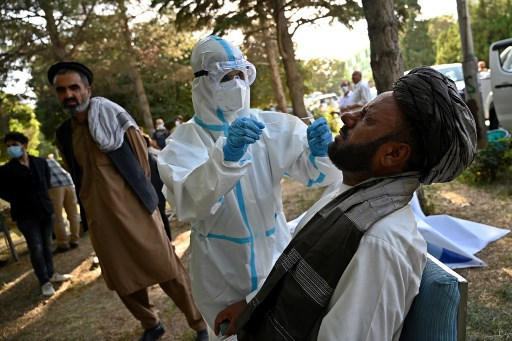Popular Reads
Top Results
Can't find what you're looking for?
View all search resultsPopular Reads
Top Results
Can't find what you're looking for?
View all search resultsAfghans begin mega gathering to decide fate of 400 Taliban prisoners
Change text size
Gift Premium Articles
to Anyone
T
housands of Afghans began a three-day gathering in Kabul on Friday to decide whether to release about 400 Taliban prisoners, including many involved in attacks that killed scores of Afghans and foreigners.
The prisoners' fate is a crucial hurdle in launching peace talks between the two warring sides, which have committed to completing a prisoner exchange before the talks can start.
US Secretary of State Mike Pompeo urged the release of the detainees, promising help if the nation moves forward on peace efforts.
"We acknowledge that the release of these prisoners is unpopular," Pompeo said in a statement before the first session started.
"But this difficult action will lead to an important result long sought by Afghans and Afghanistan's friends: reduction of violence and direct talks resulting in a peace agreement and an end to the war."
Kabul has released almost 5,000 Taliban inmates, but authorities have balked at freeing a final 400 or so demanded by the Taliban.
"The Taliban said if these 400 are released, then within three days direct talks will start," President Ashraf Ghani said as he opened the loya jirga -- a traditional Afghan meeting of tribal elders and other stakeholders sometimes held to decide on controversial issues -- at a university hall.
"If they are not freed, not only would they continue the war but they would intensify it. But it was not possible to release them without consulting the nation."
According to an official list of the Taliban prisoners seen by AFP, many of the inmates are accused of serious offences, with more than 150 of them on death row.
The list also includes a group of 44 insurgents of particular concern to the United States and other countries for their role in "high-profile" attacks.
They include five insurgents linked to the 2018 attack against the Intercontinental Hotel in Kabul that killed 40 people, including 14 foreigners.
A Taliban militant involved in the massive May 2017 truck bombing near the German embassy in Kabul is also on the list, which includes a former Afghan army officer who killed five French troops and wounded 13 in 2012 in an insider attack.
"There are definitely some prisoners that people don't want released, mostly because they are guilty of having killed coalition troops and nationals," a Western official familiar with the case told AFP on condition of anonymity.
The loya jirga
About 3,200 dignitaries are participating in the three-day assembly, Masoom Stanekzai, the head of the organizing committee, said.
They are expected to pass a resolution on Sunday but their decision is not legally binding and the previous government once rejected a jirga's recommendation.
"We already know that the 400 Taliban prisoners will also be released as that was the demand of the Taliban to the US," Kabul-based political analyst Sayed Nasir Musawi told AFP.
The Taliban, which has fulfilled its side of the prisoner swap, on Friday dismissed the jirga, saying it did not represent the nation.
According to the prisoner list, the Taliban is also demanding the release of an insurgent involved in the 2018 attack against British security firm G4S as well as several militants involved in the killing of US soldiers.
Two militants involved in a suicide attack targeting a NATO convoy in Kabul in 2015 that killed 12 people, including three Americans, were also among the 400.
Another pair are also on the list for the 2003 murder of Bettina Goislard, a United Nations refugee worker.
"Secret trials and torture to coerce confessions may make it impossible to determine which prisoners actually committed serious crimes," Human Rights Watch cautioned ahead of the loya jirga.










